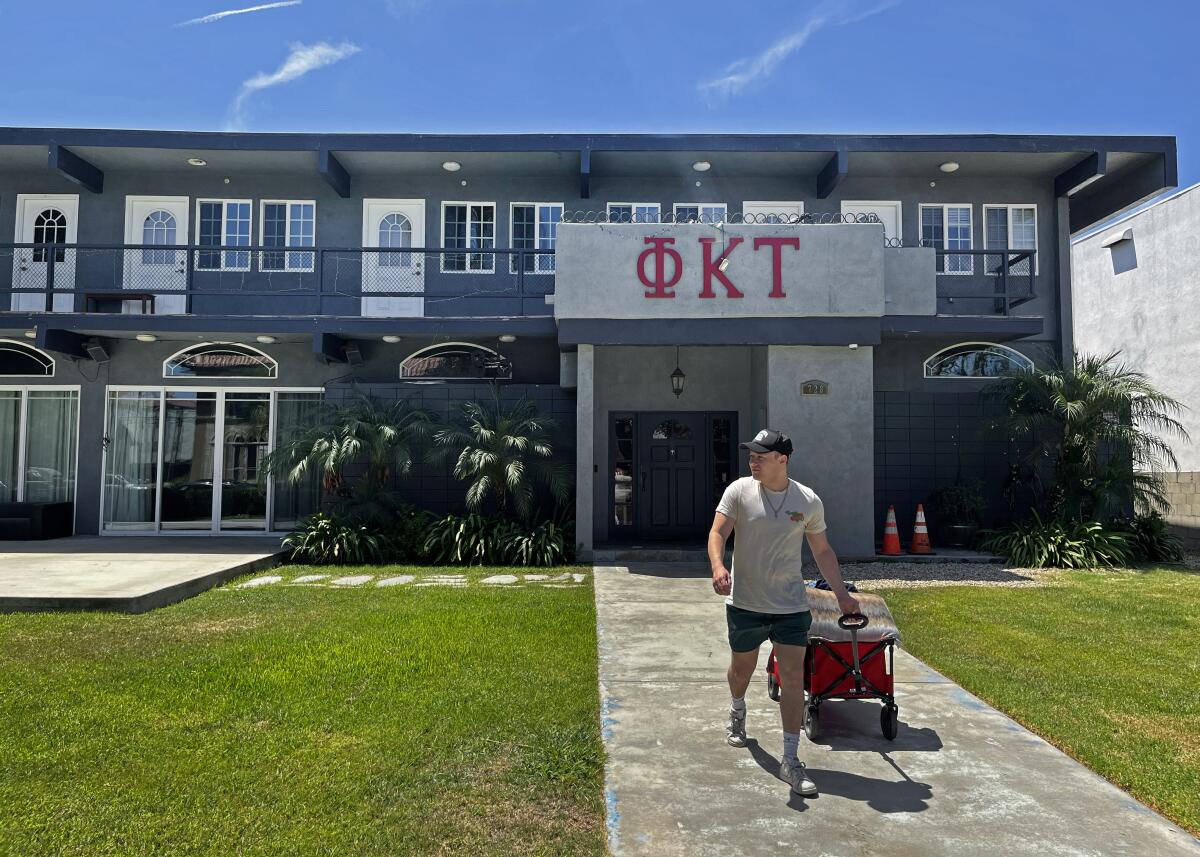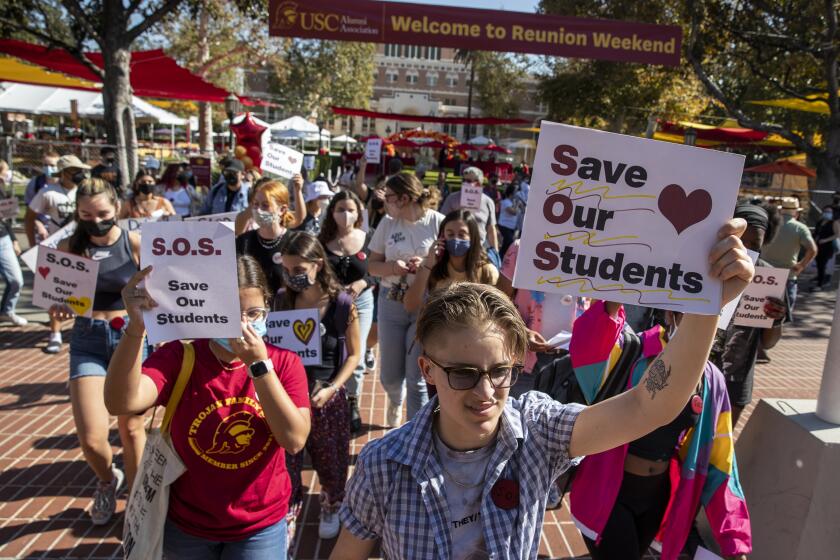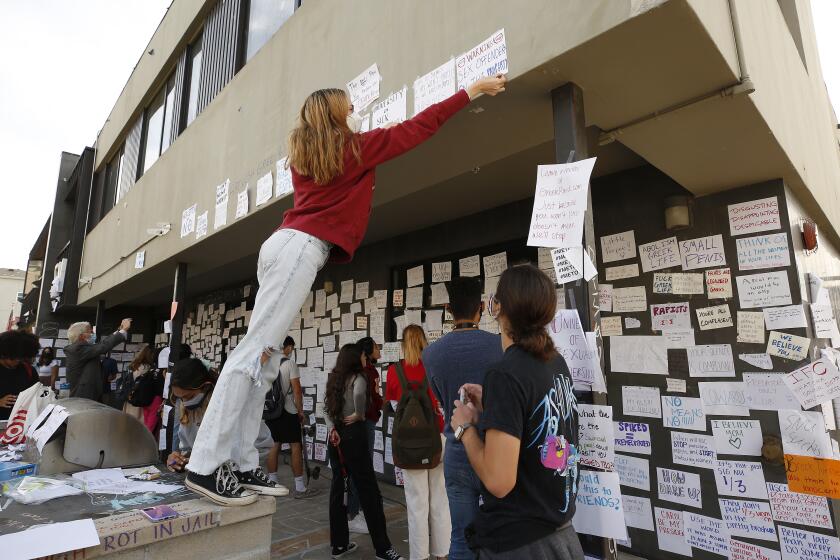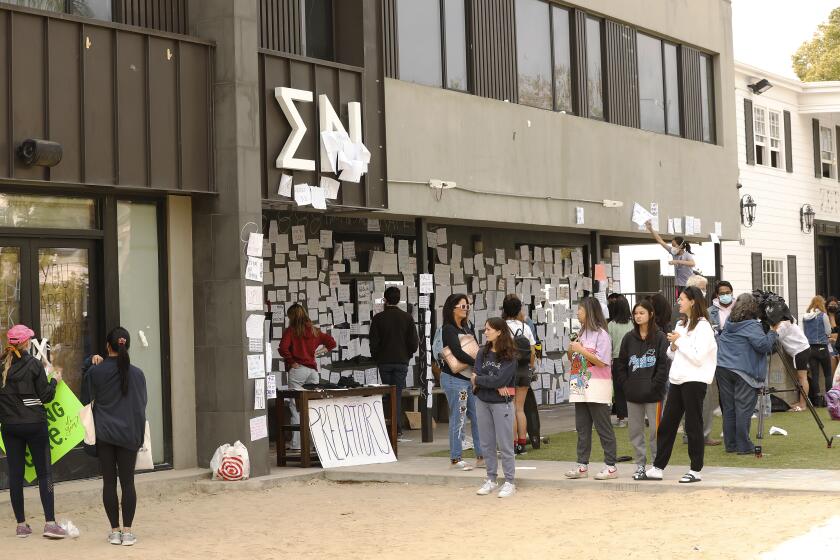6 fraternities disaffiliate from USC, prompting harsh warnings from university

- Share via
In a mutiny against strict party rules imposed last year following allegations of frat house sexual assaults, six USC fraternities formally disaffiliated from the university Friday — prompting warnings of “serious ramifications” from campus administrators.
“We are disappointed that some USC fraternities are following an unfortunate national trend by disaffiliating from the university — against our strong recommendations,” USC said in an Instagram statement Friday night. “This decision seems to be driven by the desire to eliminate university oversight of their operations ... and goes against 130 years of tradition.”
USC officials had given fraternities a Friday deadline to convey their decision, as students prepare to return to campus next week. Monique S. Allard, interim vice president for student affairs, told The Times on Friday that officials are still actively engaged in conversations to persuade other fraternity leaders to stay affiliated and benefit from the vast health and safety resources offered by campus professionals.
Fraternities that choose to disaffiliate will lose the right to use the USC logo or brand, access the campus Greek life portal, participate in campuswide committees and club fairs and secure personal and professional leadership opportunities, according to an Aug. 6 letter sent by Allard and Devin Walker, director for fraternity and sorority leadership development.
“Like other universities across the country, we will strongly recommend that our students not join fraternities that are unaffiliated with USC,” the letter said. “In fact, we would post the names of unaffiliated chapters online and actively dissuade students from joining such organizations.”
Despite those warnings, six of the 15 chapters in the USC Interfraternity Council so far have chosen to sever their relationship with USC. They are Kappa Alpha Order, Pi Kappa Alpha, Sigma Alpha Mu, Sigma Chi, Tau Kappa Epsilon and Zeta Beta Tau.
Leaders with national fraternities and most of their USC chapters did not respond to interview requests.
The showdown at USC has also played out at other campuses where fraternities have protested rules on rushing, drinking and other activities imposed to create safer environments, particularly for women. A 2019 survey of 182,000 students at 33 four-year campuses by the Assn. of American Universities found that fraternity houses were the top location cited in reports of nonconsensual sexual touching.
USC President Carol Folt acknowledged a “troubling delay” in warning the campus community about allegations of drugging and sexual assault by a fraternity last month
Fraternities have disaffiliated from such campuses as the University of Colorado Boulder, West Virginia University, Duke University and the University of Michigan. Many objected in particular to bans against recruitment of first-year students during fall semester — a rule that USC also essentially imposes with requirements that students first complete 12 units of coursework and maintain a 2.5 GPA before being eligible to join a campus-affiliated fraternity.
Still, 98.7% of 6,210 member chapters in 57 national and international men’s fraternities represented by the North American Interfraternity Conference are operating with campus recognition, the group said in a statement.
Both USC and the fraternities have much to lose if they break their connection, said John Hechinger, author of “True Gentlemen: The Broken Pledge of America’s Fraternities,” a 2017 book on fraternity culture focusing on Sigma Alpha Epsilon.
“It’s kind of a nightmare for universities when fraternities disaffiliate ... because they’ll likely engage in a lot of the behavior that alarmed the administration, but the school then has very little leverage left,” Hechinger said.
The Sigma Nu fraternity suspension has ignited a fury of protests against toxic Greek culture
“These chapters are going to lose a lot too,” he added. “It can’t be good for fundraising or recruitment. Using campus facilities has great value. Being able to advertise on and recruit on the website is a big deal. And the fact that [USC] is going to actively discourage people could really hurt them.”
The issue exploded last fall at USC, one of the nation’s top-ranked campuses for Greek life where about 17% of undergraduates are members of 48 fraternities and sororities.
That’s when the university acknowledged that it had delayed warning the campus community about six reports of drugging and one of sexual assault at Sigma Nu in September. An additional eight reports of sexual assault and seven reports of drugging taking place at various times allegedly involving other unnamed fraternities were subsequently filed in October.
The revelations sparked huge protests involving hundreds of campus members, with some demands to abolish fraternities altogether. Five Title IX investigations related to those allegations are underway, Allard said.
Under new guidelines, all fraternity members must agree to follow strict rules before they can resume social activities.
In response to the furor, USC President Carol L. Folt pledged last fall that she would launch reform efforts as part of her mission to “confront what is wrong and lead the effort to fix what is broken.”
A working group of fraternity and sorority leaders, faculty, administrators and staff subsequently drew up an action plan to strengthen safety measures. They include posting security guards at parties, including stairwells and hallways leading to bedrooms; using scanners to screen for fake IDs; distributing wristbands to those older than 21; banning kegs; and requiring risk review meetings before and after events. A summary was released last week.
USC suspended social events for all Interfraternity Council chapters last fall but lifted restrictions for at least nine members after they completed required safety training. Five fraternities remain barred from recruiting, holding social events or both.
The North American Interfraternity Conference opposes blanket penalties and broad recruitment restrictions as unfair to fraternities that did no wrong.
But fall rush for first-year students “has been repeatedly shown to be unsafe for new students,” the USC statement said.
“It’s ideal for students to have one semester in their first time on a college campus to connect academically and socially before engaging in the immersive experience of recruitment, which is pretty time intensive,” Allard said, adding that many other universities also bar fall rush for first-year students.
In its Instagram statement, USC said that disaffiliating fraternities were chafing at campus measures designed to prevent sexual assault and drug abuse and deal with issues of mental health and underage drinking. Fraternities were also “pushing back at the time it takes to investigate serious issues like sexual assault” but those processes are regulated by the state and federal government, USC said.
At least one fraternity, Phi Kappa Tau, told The Times in an Instagram message Friday that members were “still trying to learn more about the situation ourselves so that we can better evaluate all of our options” but had no plans to disaffiliate from USC at this time.
On fraternity row along 28th Street near USC, one member at a fraternity that plans to disaffiliate said Friday that his house is choosing to sever ties with the university because they want more freedom and chafed at rules that barred social events for all Interfraternity Council members.
“What happened down there was really awful at Sigma Nu, but the rest of the row didn’t think it was really fair,” said the fraternity member, who asked to keep his name and organization anonymous. “We find all of our friends here.”
The student said his frat plans to notify the university Friday that it intends to disaffiliate. Fraternities have held conversations over the last year about splitting, he said, adding that he feels the university was pushing them out anyway and that Greek life on campus gets a bad rap.
“For us, it’s just a bunch of guys hanging out,” he said.
He added that frats that disaffiliate are working with professionals to create their own interfraternity council and that it would probably be operating in time for fall recruitment — which would likely include freshmen. As of Friday, Sigma Chi and Tau Kappa Epsilon had posted fall rush forms with sign-ups open to first-year students.
Allard said she hoped fraternities considering leaving will rethink their actions. She added that even if they disaffiliate, individual students would remain free to participate in all campus activities — and remain subject to Title IX and other campus conduct rules.
“They’re all students, part of USC, and we care about all of them,” Allard said. “So it’s really important to us that they take the time to think through any potential decisions to make changes and their partnership with the university.”
More to Read
Sign up for Essential California
The most important California stories and recommendations in your inbox every morning.
You may occasionally receive promotional content from the Los Angeles Times.















